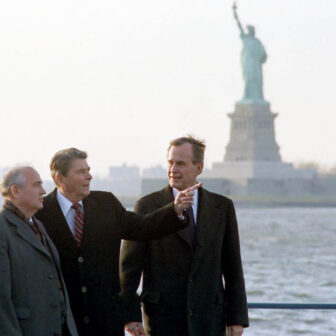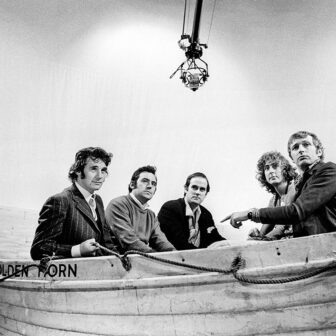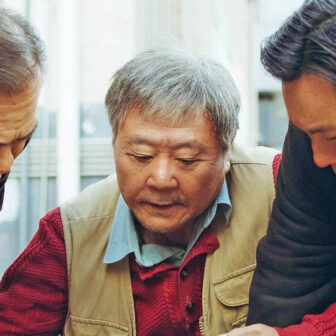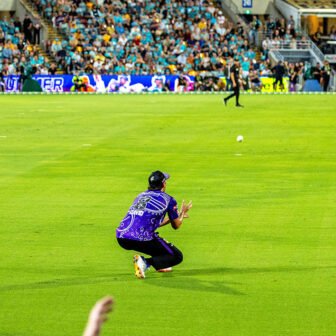Looking back on the past twelve months, I wonder if 2017 was the year that never really happened. It kicked off in January with an event the pundits assured us couldn’t transpire — the inauguration of Donald Trump — and from there everything careered off the rails into a parallel universe.
On Planet America, Chas Licciardello became increasingly shrill and incoherent in his attempts to interpret the phantasmagoria streaming from Capitol Hill. Licciardello was among those who had pronounced that there was no way a Trump presidency was on the cards. Once it was a done deal, the commentary game was under a law of diminishing returns. Who could possibly tell which way the course of events was trending?
In the days following the November 2016 election, a tweet circulated a report that the scriptwriting team for The Americans had resigned en masse. How could you go on trying to make this stuff up, even if you were half crazy? And The Americans is at least half crazy. A husband and wife team who run an orderly middle-class household in Washington are leading a double life as Soviet agents. When they’re not cooking meatloaf for dinner, attending the school concert or cheering the kids on at the Saturday match, they are seducing diplomats and assassinating anyone who threatens the interests of the Mother Country.
It’s preposterous yet utterly addictive, largely due to compelling performances by Keri Russell and Matthew Rhys in the lead roles and the skills of a scripting team that manages to sustain the improbable mix of hardcore spy drama and bourgeois soap opera. Yes, they did carry on through to the end of a fifth series, in spite of being outdone by the reality show up in the White House, but neither of the latest two series has yet been made available in Australia.
House of Cards was also outdone by #45’s new White House regime. In a plot twist that takes us beyond postmodernism, the real Kevin Spacey was forced to resign from the fictional office of president following harassment allegations similar to those faced by the real President Trump, whose resignation is still the much-anticipated culmination of the story arc in the actual White House. Temporarily derailed by this development, House of Cards will be back next year with a female president, seeing we didn’t get the one we expected following the 2016 election.
For a while, the dramatis personae of the Trump administration provided great opportunities for impersonators, but the cast was changing so fast the late-night comedy shows couldn’t keep up. South Park, freewheeling between the absurdity and the horror of it all, did better in the comedy stakes.
In episode 10 of the current season (the only episode still streaming on SBS), night falls over the snow-laden houses of South Park. There’s a burst of thunder and a child wakes, screaming in terror. “I saw him! He’s going to get me!” The president is on the loose again, lurking in the surrounding forest. Other children have seen him too, and they band together in a hunting party whose chances of trapping him are significantly better than those of Robert Mueller.
Britain, meanwhile, has been going through another form of lunacy, with Brexit turning into the biggest fiasco in postwar domestic politics. During the month I spent there recently, the madness was evident on a daily basis. Commentary on television news and current affairs was rabid, and the BBC’s Question Time (the equivalent of our Q&A) bordered on hysterical.
None of this, though, was evident from the British television offerings that found their way to us in Australia. Series 2 of The Crown and the eight-part drama Victoria show sovereigns behaving badly behind closed doors, but the public face of the monarchy is all poise. For those beset by the impossibilities of the present, the figure of the Queen embodies all our yesterdays.
On ABC, we’ve had an endless parade of Grand Designs, the Channel 4 series compered by Kevin McCloud, in which a succession of unlikely and usually remote edifices are transformed by obsessive young couples with unique and unorthodox visions of their ideal homes. Yet in the final Reveal, when McCloud returns to see the outcomes of all the crises and labourings and high-risk loan negotiations, it’s always the same: there’s the vast boardroom table in the dining area, the Hyatt bathroom, and a suite of bedrooms sufficient to accommodate a 1930s house party.
For those who prefer to be on the move, there’s Michael Portillo’s Great Railway Journeys, shown on SBS. Cultural nostalgia is at work here, too. Portillo, a one-time member of the Thatcher cabinet, has reinvented himself as a latter-day Victorian dandy. His jackets are to die for, in shades of lime, tangerine, lemon, raspberry and grape. (Apparently he has done wonders for the men’s tailoring business.) He carries with him that essential accessory of the Victorian gentleman traveller, Bradshaw’s Guide, from which he reads aloud as he sits in the railway carriage watching the unfolding patchwork of fields. So what if it’s 2017?
Joanna Lumley is a more adventurous traveller. Her Trans-Siberian Adventure was followed by a tour in Japan, and her Indian odyssey is currently airing on the ABC. She’s too gushy and sentimental for my taste, but from time to time you do get flashes of Patsy, the wicked comedic persona from Ab Fab.
My pick of the 2017 travelogues is Shaun Micallef’s three-part series Stairway to Heaven. It was shown on SBS at the start of the year, and has remained vividly in my mind as a genuine use of the medium for exploration. Instead of going in quest of great landscapes and picturesque examples of cultural diversity, Micallef went on “a curious journey to find the meaning of life.” The ingenuous pretext somehow just worked. Curiosity itself is a state that enlarges if it is allowed free rein.
Micallef made his way into the faith communities of the Mormons in Utah, stayed at the Casa de Dom Inácio spiritual healing retreat in central Brazil, and tagged along with a small army of End of Days fundamentalists making camp in the woods around Arkansas. He asked questions and elicited stories and opinions, but at no stage did he slip into the mode of interrogation. Travel programs have a way of editing the world into a timeslot, framed by the camera lens. Stairway did the opposite, leaving a sense of the world as still unbounded and essentially unknowable.
Australian television this year has for the most part been a tale of loss and woe, with more cuts at the ABC (ah, Lateline…) and the sudden death of John Clarke (ah, that smile…). Five minutes a week with Clarke and Dawe told you pretty much all you needed to know about politics.
Still going strong, though, is the Working Dog team, which came up with a third series of Utopia to match the consummate absurdism of the first two. If a twenty-first-century Alice fell down a rabbit hole, this is the kind of world she would find. It is filled with overblown personalities, dressed in a little brief authority, giving orders and orchestrating events without the slightest sense of how to accomplish anything at all. Human reason has been replaced by arbitrary determinations based on bizarre systems of regulation.
The scripting is state of the art. Each episode is an intricate weave of events and situations that converge in some moment of exquisite chaos, as when human resources manager Beverley Sadler (Rebecca Massey) and media manager Rhonda Stewart (Kitty Flanagan) give a PowerPoint presentation on the new staffing model. An animated graphic shows the interplay of office-holders and responsibilities in a proliferating set of floating circles, all explained with dictatorial relish. If Lewis Carroll’s Red Queen were alive in 2017, she’d be head of HR. ●




